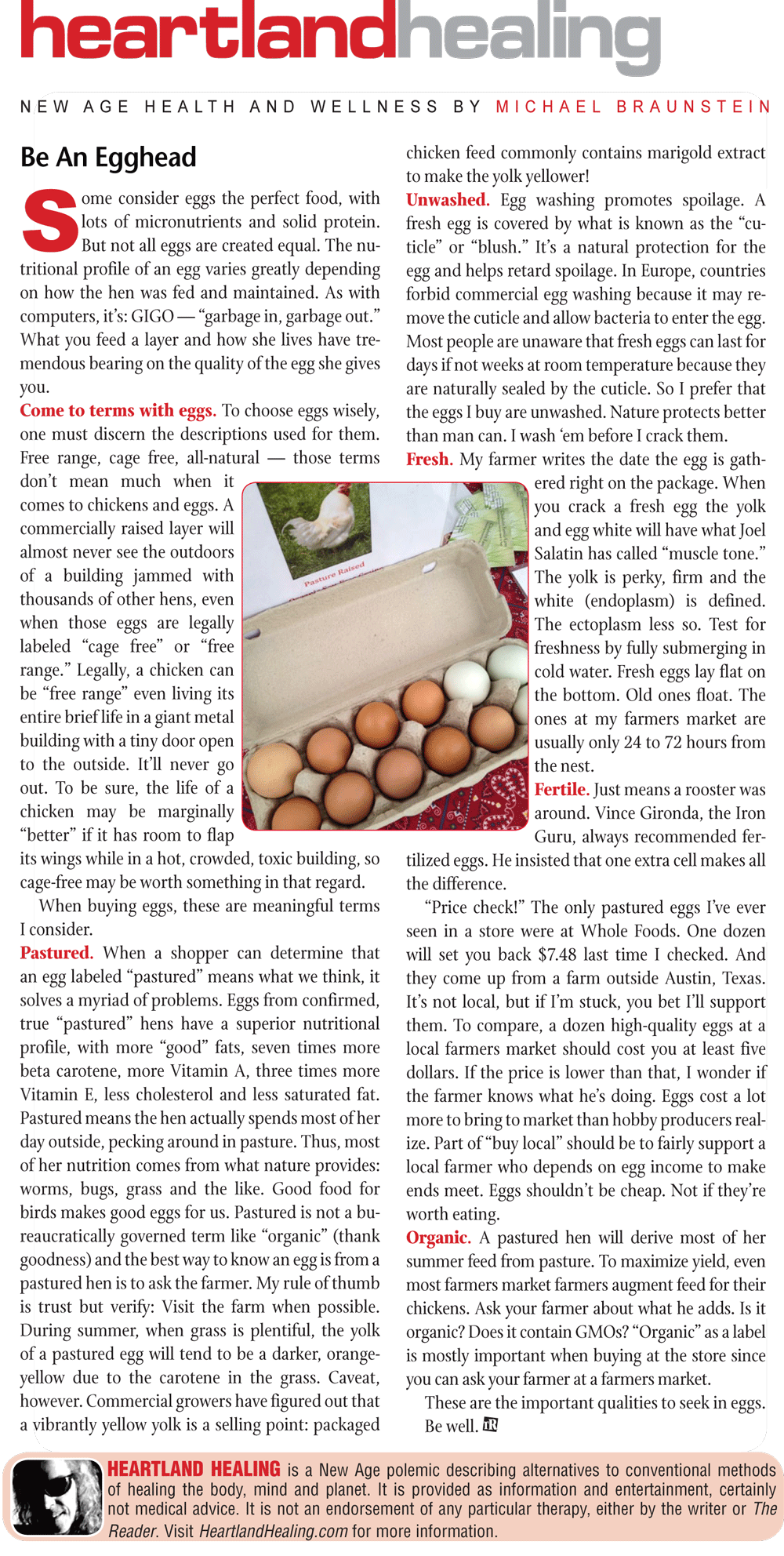|
||||||
| Back to Column Archives | ||||||
EGGS ARE NATURE'S PERFECT FOOD. Many people consider eggs the perfect food, with abundant nutrients and balanced protein. But not all eggs are created equal. The nutritional profile of an egg varies greatly depending on how the hen was fed and maintained. As with computers, it’s: GIGO — “garbage in, garbage out.” What you feed a layer and how she lives have tremendous bearing on the quality of the egg she gives you. Come to terms with eggs. To choose eggs wisely, one must discern the descriptions used for them. Free range, cage free, all-natural — those terms don’t mean much when it comes to chickens and eggs. A commercially raised layer will almost never see the outdoors of a building jammed with thousands of other hens, even when those eggs are legally labeled “cage free” or “free range.” Legally, a chicken can be “free range” even living its entire brief life in a giant metal building with a tiny door open to the outside. It’ll never go out. To be sure, the life of a chicken may be marginally “better” if it has room to flap its wings while in a hot, crowded, toxic building, so cage-free may be worth something in that regard. When buying eggs, these are meaningful terms I consider. Pastured. When a shopper can determine that an egg labeled “pastured” means what we think, it solves a myriad of problems. Eggs from confirmed, true “pastured” hens have a superior nutritional profile, with more “good” fats, seven times more beta carotene, more Vitamin A, three times more Vitamin E, less cholesterol and less saturated fat. Pastured means the hen actually spends most of her day outside, pecking around in pasture. Thus, most of her nutrition comes from what nature provides: worms, bugs, grass and the like. Good food for birds makes good eggs for us. Pastured is not a bureaucratically governed term like “organic” (thank goodness) and the best way to know an egg is from a pastured hen is to ask the farmer. My rule of thumb is trust but verify: Visit the farm when possible. During summer, when grass is plentiful, the yolk of a pastured egg will tend to be a darker, orange-yellow due to the carotene in the grass. Caveat, however. Commercial growers have figured out that a vibrantly yellow yolk is a selling point: packaged chicken feed commonly contains marigold extract to make the yolk yellower! Fresh. My farmer writes the date the egg is gathered right on the package. When you crack a fresh egg the yolk and egg white will have what Joel Salatin has called “muscle tone.” The yolk is perky, firm and the white (endoplasm) is defined. The ectoplasm less so. Test for freshness by fully submerging in cold water. Fresh eggs lay flat on the bottom. Old ones float. The ones at my farmers market are usually only 24 to 72 hours from the nest. Fertile. Just means a rooster was around. Vince Gironda, the Iron Guru, always recommended fertilized eggs. He insisted that one extra cell makes all the difference. “Price check!” The only pastured eggs I’ve ever seen in a store were at Whole Foods. One dozen will set you back $7.48 last time I checked. And they come up from a farm outside Austin, Texas. It’s not local, but if I’m stuck, you bet I’ll support them. To compare, a dozen high-quality eggs at a local farmers market should cost you at least five dollars. If the price is lower than that, I wonder if the farmer knows what he’s doing. Eggs cost a lot more to bring to market than hobby producers realize. Part of “buy local” should be to fairly support a local farmer who depends on egg income to make ends meet. Eggs shouldn’t be cheap. Not if they’re worth eating. These are the important qualities to seek in eggs.
|
||||||
|
home • directory • feature column • column archives • news • hot links • calendar
Heartland Healing is devoted to the examination of various alternative forms of healing. It is provided as a source of information and not as medical advice. It is not meant as an endorsement of any particular therapy, either by the writer or by Heartland Healing Center, Inc. © 1997- Heartland Healing All Rights Reserved • Site by Omaha's Desktop Ad Shop |




